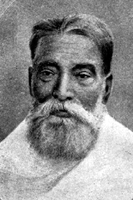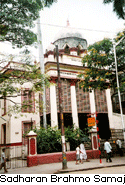 |
 Early Life Early Life
Sivanath Sastri was born on January 31, 1847. Born into devout Hindu family he was drawn to the Brahmo Samaj in his youth. Sivanath was initiated into Brahmoism, by, Keshub Chandra Sen on the same day with Ananda Mohan Bose, Krishna Bihari Sen, Rajani Nath Ray and others, in 1869, three years before he completed his brilliant university career. He had to endure fierce persecution from those who were nearest and dearest to him. He gave up idolatry and even discarded the sacred thread and thus incurred the wrath of his parents and neighbours.
Shortly after he had left the University, he began to take an active part in the work of the Brahmo Samaj.
Owing to adverse domestic circumstances he had to accept secular work. His mind, however, was not easy in this situation and the aspiration to serve the Brahmo Samaj whole heartedly made him give up a most promising career as a teacher.
Association with Sadharan Brahmo Samaj
 Since the foundation of the Sadharan Brahmo Samaj in 1878, Sivanath became the life and soul of the Samaj - as an organiser of the Samaj, as, mission,ary and as minister of its chief congregation. Since the foundation of the Sadharan Brahmo Samaj in 1878, Sivanath became the life and soul of the Samaj - as an organiser of the Samaj, as, mission,ary and as minister of its chief congregation.
 He was associated with Ananda Mohan Bose in the establishment of City School, City College and School- and was its first Secretary. He was editor of the Tattwakaumudi, the Bengali organ of the Sadharan Brahmo Samaj, for many years; he contributed regularly to the columns of Brahmo Public Opinion and when the paper ceased to exist, he was chiefly instrumental in the starting of the Indian Messenger. He was associated with Ananda Mohan Bose in the establishment of City School, City College and School- and was its first Secretary. He was editor of the Tattwakaumudi, the Bengali organ of the Sadharan Brahmo Samaj, for many years; he contributed regularly to the columns of Brahmo Public Opinion and when the paper ceased to exist, he was chiefly instrumental in the starting of the Indian Messenger.
He helped in the establishment of the Brahmo Balika Shikshalaya and became its Secretary when it was in sore need of his powerful aid. He founded the Rammohun Roy Seminary at Patna. He established the Sadhan Ashram as a centre of spiritual activity and a home for the training of mission workers. As a minister he exercised, a profound influence over hundreds of eager listeners. As a missionary he carried the message of the Brahmo Samaj to the furthest corners of India, attracting a body of enthusiastic hearers round him wherever he went, and paid a visit to England. By his inspiring eloquence, his earnestness, his noble thought, and above all, by his wealth of spiritual experience, bearing constant testimony to the joy of worship and the power of prayer, he had the chief share among his, contemporaries in the building up of our life.
Sivnath opposed Keshub and the New Dispensation very effectively.  In his extensive mission tours of undivided India he was able to win over a countless number of Brahmos to the proposition that Sadharan Brahmo Samaj came into existence to save Brahmoism from Keshub's betrayal. He proved to be a good teacher of the missionaries, whom he inspired with a love of rational theism, social reform, humanism, and political liberalism. At varying times Sivnath had at his disposal talented and highly spiritual missionaries such as Bijoy Krishna Goswami in East Bengal, Shiv Narayan Agnihotri in Punjab, Bipin Chandra Pal in Punjab and South India, Hem Chandra Sarkar in South India, Nagendranath Chatterji in Western India, Ram Kumar Vidyaratna in Eastern India and Nilmani Chakraborty in Assam. In his extensive mission tours of undivided India he was able to win over a countless number of Brahmos to the proposition that Sadharan Brahmo Samaj came into existence to save Brahmoism from Keshub's betrayal. He proved to be a good teacher of the missionaries, whom he inspired with a love of rational theism, social reform, humanism, and political liberalism. At varying times Sivnath had at his disposal talented and highly spiritual missionaries such as Bijoy Krishna Goswami in East Bengal, Shiv Narayan Agnihotri in Punjab, Bipin Chandra Pal in Punjab and South India, Hem Chandra Sarkar in South India, Nagendranath Chatterji in Western India, Ram Kumar Vidyaratna in Eastern India and Nilmani Chakraborty in Assam.
Poet and Social Reformer
Sivnath Shastri was in ardent sympathy with the aspirations of his countrymen for political advancement, and was one of the founders of the Indian Association, a fore-runner of the Indian National Congress. He occupied a conspicuous place among workers in the cause of temperance and social reform, and even strove to win for women the place of co - worker with man in every sphere of useful activity.
Amidst his tumultuous activities, Sivnath rendered some valuable services to Bengali literature as a poet as well as one of the finest writers of Bengali prose. Special mention may be made of his collection of poems Pushamala and Pushanjali, his novels Yugantar and Nayantara, his Autobiography and the historical masterpiece Ramtanu Lahiri o Tatkalin Banga Samaj and a book on the religious way of life Dharmajivan. He also has written an authentic history of the Brahmo Samaj, though sometimes from a partisan angle, from the time of its inception to 1911.
He made his aim to promote the cause of righteousness and truth by his writings, ever seeking to :
"Arouse the sensual from their sleep of Death, and win, the vacant and the vain to noble raptures." Among the distinctive notes of his hymns are a deep feeling of self-abasement and a penetrating consciousness of Divine grace.
In the history of the Brahmo Samaj and the progressive movement in this country, Pandit Sivanath Shastri will ever occupy a very high place as a leader in whom towering intellectual gifts were united with absolute sincerity of purpose, great self sacrifice and an unwavering loyalty to the exalted ideals of the Brahmo Samaj. If the worth of a movement is to be measured by its contributions to noble thought and the memories and traditions of high endeavour created by it as a guiding light to coming generations. The Brahmo Samaj has been enriched beyond measure by the thought and work of Sivnath Shastri. |
| - Adapted from Indian Messenger 1919 |
|